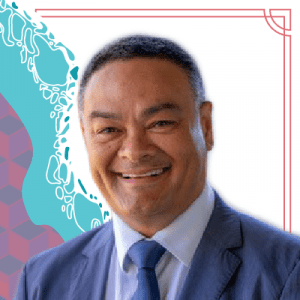“It’s important to recognize that with our privilege comes the responsibility to uplift and support those who are less fortunate. By working together, we can truly make a meaningful difference in the lives of others.”
Saturday, September 28, 8:00 – 9:00 am (ET), presented during the Opening Ceremony
MBCC Grand Ballroom A/B

The John Conley, MD Lecture on Medical Ethics award is named in recognition of Dr. John Conley’s passion for head and neck surgery and belief in the professionalism of the practice of medicine. The 2024 lecturer is Professor Kelvin M. Kong, MBBS BSc, FRACS, MD, a practicing otolaryngologist and head and neck surgeon in Newcastle on Awabakal and Worimi Country in New South Wales, Australia. He treats a wide range of pediatric and adult patients, with a particular focus on otitis media, pediatric airway, cochlear implantation, and voice disorders.
He is also a professor at the University of Newcastle’s School of Medicine and Public Health. As one of only five Indigenous surgeons in Australia, Dr. Kong is passionate about addressing the disparity in health outcomes between Indigenous and non-Indigenous children. Each year, he spends a portion of his time working in, and for, remote Australian communities providing access to quality healthcare that would otherwise be limited or unavailable.
Q: Congratulations on being named Guest Lecturer for the John Conley, MD, Lecture on Medical Ethics. What does it mean to be presented with this esteemed recognition?
Dr. Kong: I’m absolutely thrilled but also somewhat circumspect to be given such a spotlight. This is a real recognition of the fight against ear disease that we are experiencing in Australia. I’m honored to receive such an opportunity but simultaneously saddened to receive it on the back of my community suffering from the effects of otitis media.
Q: You are one of only five Indigenous surgeons in Australia. How did you decide to pursue a career in otolaryngology and head and neck surgery?
Dr. Kong: When I was growing up, my family and the community used to come to our house to receive medical assistance. My sisters and I used to help our mother with an array of care and treatment, but it wasn’t until I was in until high school and had a more mature realization that there was a disparity in healthcare access among my people. My non-Indigenous friends were not seeking this kind of help. I knew I really wanted to give back, so I was fortunate to attend medical school and gain an early exposure to otolaryngology, which has such a strong community focus. ENT care provides a breadth of practice that is also intimately exposed in Indigenous communities. It’s a wonderful feeling to be able to help.
Q: Getting a little more specific, what is it about otitis media, pediatric airway, cochlear implantation, voice disorders, and the like that caught your professional interest?
Dr. Kong: We cannot let our medical colleagues know how much fun we have in ENT, otherwise, when our “secret” gets out, we will be inundated with more physicians wanting to practice in the specialty! Truthfully, the clinical science, anatomy, and physiology of hearing is so beautiful. As intriguing as it is to offer patient care through ENT medicine, the impact we can have on a growing child is priceless.
Q: Your presentation will discuss the disparity in health outcomes between Indigenous and non-Indigenous children with ear disease. Without giving too much away, can you give readers an overview of the situation with regards to medical ethics?
Dr. Kong: Our privilege and responsibility as caregivers should not be underestimated. I hope to share a glimpse of my life within the Worimi community, while embracing a global perspective to engage our audience in the work we do. At the same time, I look forward to showcasing the beauty of my country to attendees here in Miami, our specialty, and the rest of the world.
Q: What are some of your proudest work achievements, particularly within remote communities?
Dr. Kong: We recently hosted the OMOZ (Otitis Media Australia) 2024 conference in my hometown. It was inspiring to see so many Indigenous researchers, presenters, and community members leading discussions and demonstrating how far we’ve come from traditional medical models. We purposefully held the event within the community, for the community, to bring together researchers and clinicians on this special journey. It was incredibly enriching, and seeing the pride in my community’s smiles was truly invaluable.
Q: What challenges or roadblocks continue to interfere with achieving health equity in your communities, country, and even around the world?
Dr. Kong: Equitable access to quality healthcare is one of the most pressing global challenges. As healthcare becomes more advanced, complex, and costly in an increasingly fast-paced world, it can sometimes feel impersonal. While the medical breakthroughs we celebrate are remarkable, the true measure of our progress lies in how accessible care is to all populations.
Q: What can medical students, residents, and physicians at all career levels expect to take away from your presentation in Miami?
Dr. Kong: I hope attendees walk away with a deep appreciation for the impact we can have as healthcare professionals. It’s important to recognize that with our privilege comes the responsibility to uplift and support those who are less fortunate. By working together, we can truly make a meaningful difference in the lives of others.
Q: Is there anything else you would like to share about your experience, research, or the Guest Lecture?
Dr. Kong: The ENT community is a small but close-knit global network and being part of such an exceptional group of clinicians is both exciting and deeply rewarding. I’m grateful for the opportunity to contribute and share our work with a wider audience. Thank you for allowing me to help spread awareness and try to make a difference.

